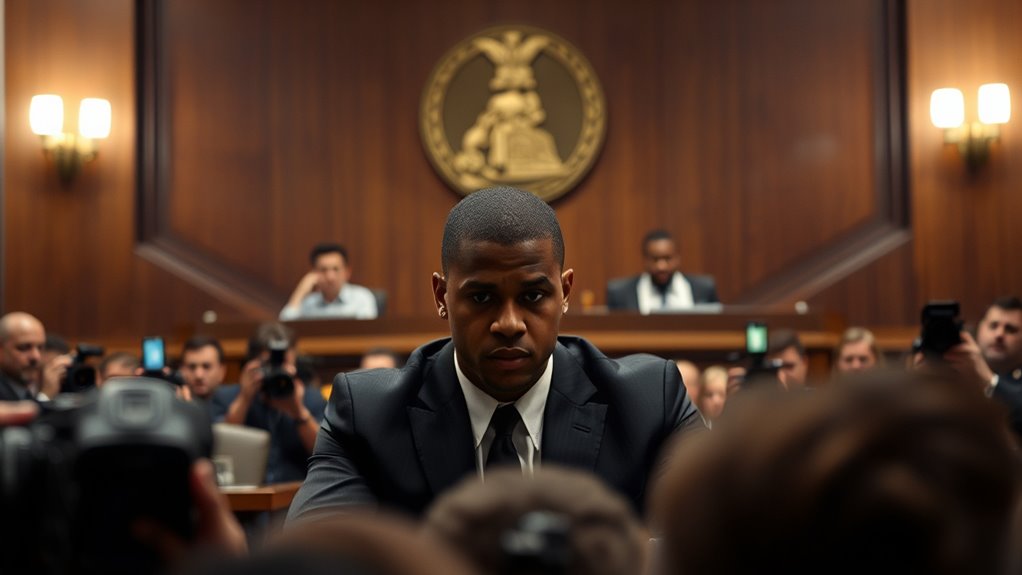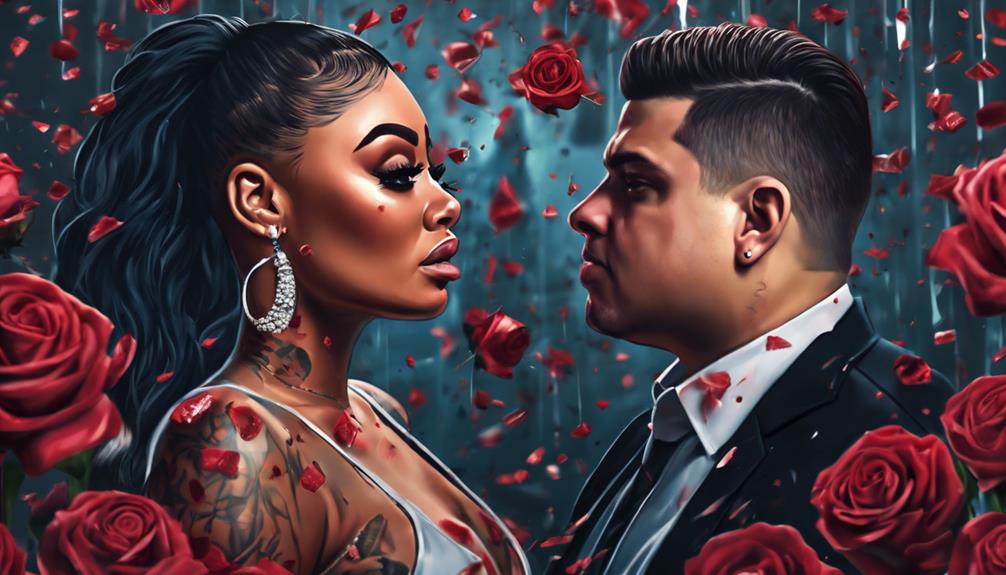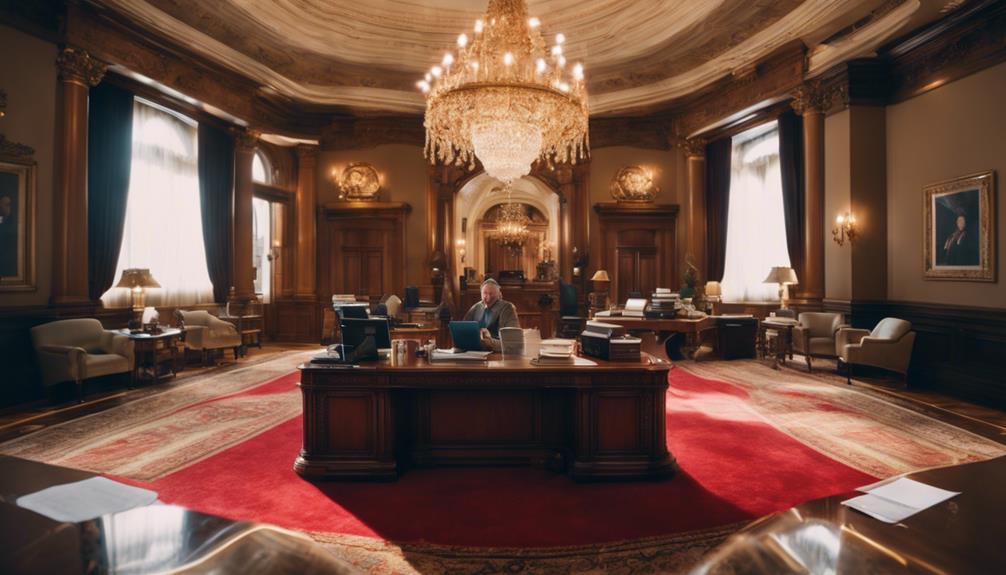Chris Brown’s assault cases have set significant legal precedents, especially around celebrity accountability and self-defense claims. His 2009 incident with Rihanna shaped long-lasting public perceptions, often linking him to violence. Ongoing allegations and civil suits reinforce a narrative of recurring issues, influencing societal views on accountability for high-profile figures. If you’re curious how these cases continue to impact legal standards and public opinion, there’s much more to explore.
Key Takeaways
- The 2009 Rihanna assault significantly shaped legal and public perceptions of Brown’s pattern of violence.
- High-profile civil and criminal cases involving Brown have set legal precedents in celebrity accountability.
- Media coverage and social media debates influence public opinion, often reflecting or reinforcing perceptions of recurring violence.
- Brown’s legal defenses citing self-defense demonstrate challenges in prosecuting celebrity misconduct.
- Ongoing lawsuits and criminal cases contribute to the complex narrative surrounding celebrity misconduct and legal responses.

Have you ever wondered how a celebrity’s legal troubles can overshadow their career? Chris Brown’s case is a prime example. It all started in February 2009 when felony assault charges were filed against him after he physically attacked Rihanna, his then-girlfriend. The assault left her with visible injuries, and she was hospitalized, sparking widespread media coverage. That incident permanently altered the public’s perception of Brown, marking him as a figure associated with violence. In the years that followed, his legal issues persisted, and the pattern of allegations continued to grow. His early incidents, including the 2009 assault, set a precedent for his ongoing legal challenges. Fast forward to February 2023, when Brown was allegedly involved in an assault at a London nightclub. Reports claim he smashed a tequila bottle over music producer Abraham Diaw’s head, leading to a police warrant for grievous bodily harm. The incident intensified in May 2025 when Brown was arrested in Manchester on that warrant. Facing charges of grievous bodily harm, possession of an offensive weapon, and assault occasioning actual bodily harm, he appeared in UK court, pleading not guilty. Despite the serious charges, Brown’s legal team contests the allegations, claiming he acted in self-defense and that the victims provoked him. Still, the case remains unresolved as of July 2025, with the judge denying bail initially but later releasing him under strict conditions while awaiting trial. Throughout this period, civil lawsuits have added to Brown’s legal woes. In July 2024, four concertgoers filed a $50 million civil suit against him and his entourage, alleging assault at a Fort Worth concert. A security guard also sued for $1 million, claiming injuries sustained while trying to intervene. Back in February 2023, Abraham Diaw filed a civil claim against Brown for injuries and losses from the London nightclub incident. Although Diaw requested a dismissal of his suit in June 2025, the criminal case continues, and civil claims paint a consistent picture of ongoing conflict and legal disputes. Public perception remains divided. The 2009 Rihanna assault became infamous worldwide, shaping long-term views of Brown. The recent allegations, covered extensively by media, reinforce a narrative of recurring violence. Social media discussions often reference his past, with some fans dismissing new accusations as exaggerated or false, citing his claims of provocation. These ongoing cases fuel debates about accountability, celebrity privilege, and whether Brown deserves a second chance. Ultimately, his legal troubles have not only affected his reputation but also cast a shadow over his career, creating a complex and polarized public image. Legal precedents established by high-profile cases like Brown’s continue to influence public and legal responses to celebrity misconduct.
Frequently Asked Questions
How Did the Assault Allegations Affect Chris Brown’S Career Long-Term?
You see that the assault allegations had a lasting impact on Chris Brown’s career. They caused initial sales drops, damaged his image, and led to sponsorship losses. Although he rebounded with successful albums, ongoing legal troubles kept his reputation strained. Public opinion remains divided, affecting his opportunities and industry trust. Overall, the allegations created long-term hurdles, making it harder for him to fully regain the mainstream success he once had.
What Legal Strategies Were Used in Chris Brown’S Assault Cases?
You see, Brown’s legal team used self-defense claims, claiming he acted out of perceived threats, and gathered evidence suggesting victims provoked the altercations. They also argued some defendants weren’t involved, distancing him from responsibility. Additionally, they leveraged Brown’s financial resources to secure a high-profile bail, challenged evidence admissibility, and aimed to shift blame onto others, aiming to minimize his legal consequences and protect his reputation.
How Has Public Opinion Shifted Over the Years Regarding Chris Brown?
You’ve seen how public opinion about Chris Brown has changed over the years. After the 2009 incident, people largely condemned him, but his career rebounded as his music evolved and industry support continued. Recently, new allegations and a documentary have reignited criticism, making opinions more divided. Cultural conversations about accountability and art’s separation from personal behavior influence perceptions, showing how complex and polarized public views have become over time.
Were There Any Significant Differences in Handling the Cases Across States?
Oh, you’re curious about how different states treat assault cases? Well, in the US, it varies wildly—some states slap celebrities with harsh penalties, while others go easier, opting for probation or plea deals. Meanwhile, UK courts tend to be more strict and uniform. So, across the pond, you get more consistency, but stateside, it’s a game of legal roulette—depending on where you’re standing.
What Impact Did Media Coverage Have on the Legal Proceedings?
You see that media coverage substantially impacted the legal proceedings by increasing public pressure for swift justice and transparency. It influenced perceptions of guilt or innocence, sometimes creating biases that could affect judicial impartiality. The intense scrutiny also pushed legal professionals to be more cautious in handling the case, recognizing the power of media to shape outcomes and public opinion, which ultimately emphasized the need for responsible journalism and fair trial practices.
Conclusion
As you reflect on Chris Brown’s assault cases, it’s clear that legal battles and public opinion are intertwined like threads in a tapestry. While he faced serious repercussions, the saga highlights how fame can both shield and scrutinize. Ultimately, his story serves as a cautionary tale, reminding us that even the brightest stars can stumble. Like a storm passing overhead, public perception shifts—leaving behind lessons that echo long after the headlines fade.










